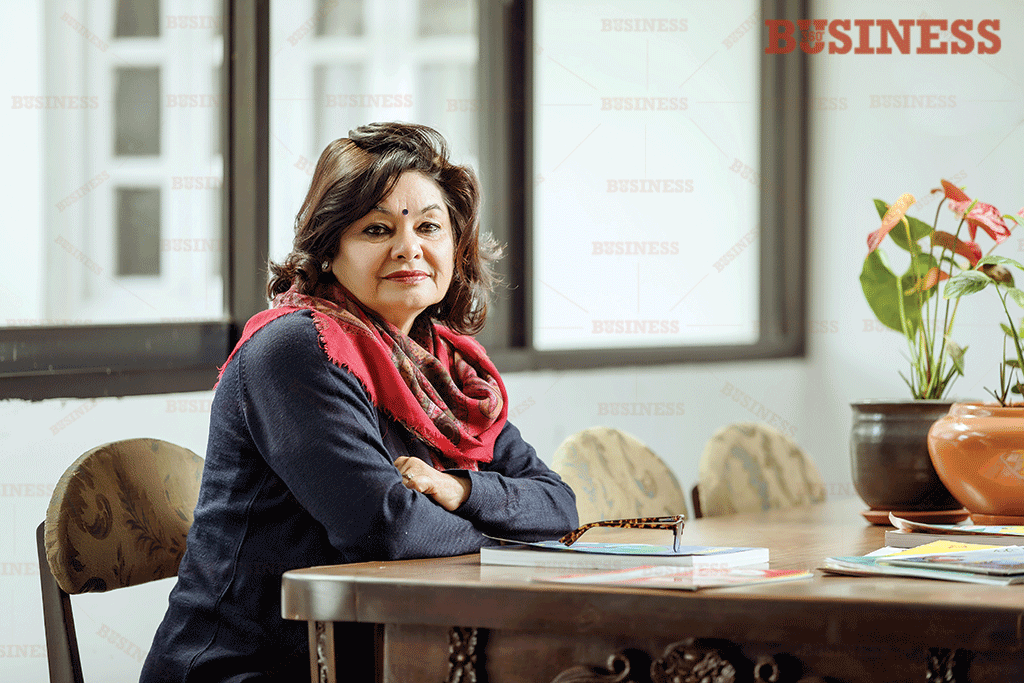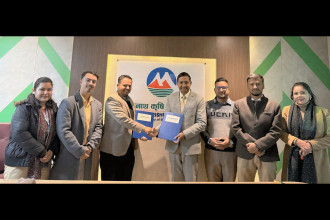
SHANTA DIXIT
FOUNDER & DIRECTOR
RATO BANGALA SCHOOL
Text: Ujeena Rana
A day before the interview, news was out that AAP leader Arvind Kejariwal had won his third term in the Delhi elections. His reforms on water, electricity, health and education is said to have earned him the votes. Reportedly, state-run schools in Delhi have given a run for money to the private schools.
“It’s not so easy to replicate what AAP has done in Delhi,” Shanta Dixit, the Founder and Director of Rato Bangala School answers to the possibility of the AAP-esque education transformation in Nepal.“I have been to Delhi training some of the government school teachers and our child centered method was also very new to them. But the teachers also had very high credentials; they had Masters degrees, they could speak proper English, they had good Math, they had all the things that a teacher needs. It is just that they did not have child centered training that we were giving.”
A government that prioritises education will ensure that it picks the best human resource as teachers. Dixit says, “In Nepal, I don’t think the government has so far been able to hire the best minds.”
The brightest minds also do not opt for a teacher’s degree, nor will you find many parents wanting their children to seek a career in education. Finland is hailed for its education system, it prizes its teachers and puts them on the same pedestal as doctors and scientists. “You have to have the best people getting into the teacher’s degree. The government pretends that they have practiced teaching. They only have theoretical knowledge. They endorse chalk and talk,” comments Dixit.
She gives a lot of credit to Kejariwal’s luck in revamping the education system in his state. “In a way, he is lucky as Delhi has the best teachers. Moreover, we need to understand that India is now third or fourth generation educated. If you have educated people getting into education; that means the country has reasonable education. Whereas here education came much later. Our education system is terrible and so the people who get terrible education cannot then become very qualified,” she opines.
Shaping Young Minds

In one of the most watched TedTalk videos “Do schools kill creativity?” by Sir Ken Robinson, the leading argument is if schools, in fact, shun creativity in students. Sir Robinson underscores that everyone should have interest in education and that everyone has a huge vested interest in education because it is meant to take us into the future that we can’t grasp.
Dixit underlines, “Education is stimulating your brain to the maximum and not just in one way but in a myriad of ways. It includes cognition, behavioural, speech (language development), physical development and socio-emotional development. So all this is education.”
A brief tour of the campus injects a sense of autonomy that students exercise at Rato Bangala. It must be liberating for the students. Against the grain, schools have come to be known to breed fear and anxiety and thereby can pose as an obstacle to learning. Refreshingly, Rato Bangala School endorses freedom which is evident from the lack of block in-charge making rounds of the corridors, students doing their project work, assembling art pieces, roaming the campus without a hint of apprehension on their face. Lack of fear is, indeed, a prerequisite for learning.
Dixit says, “More than schooling, education starts from the pregnant mother and what the child gets immediately after they are born, how people play with them and stimulate them. Children are at home till they are two years old and that is when most of the brain develops. In the first six months, 50% of the brain grows. By the time, they are two years old, 80% of their brain is already developed. By the time they are five years old, it is 90%. Parenting and Early Childhood Development (ECD) should be the focus. When that happens, the child learns quite a lot. And of course, till 8th grade, that is when most of the learning happens. A school is also about the quality of the students that you have in the classroom but by far, it is how you work in the earliest grades that makes all the difference. There is a book by Robert Fulghum, an American author, that is titled ‘All I Really Need To Know I Learned in Kindergarten.’ There is truism to that.”
Dixit highlights ‘manners before knowledge’ practice in Japan where students need not sit for exams till the age of 10. All that a school gears up to teach the young minds are good manners and character building. “In Nepal, if you are educated, you are not supposed to do any household chores. Many parents, and I hope it changes, but many parents take pride in the fact that all that their child needs to focus on is studies and nothing else. But in fact you lose all your life skills trying to get that one grade, the first degree. That’s the negative part and that is what people have not understood,” she says.
The school attempts to engage student in projects to ensure their holistic growth and not just their grades. Dixit confides that initially they didn’t have the confidence to let the children miss classes and go out for community service. “We thought that their books were more important. But once we realised - through international research and through our own experience - we now have no problem giving children time to do meaningful things that will stay with them throughout their lives.”
Being a student at Rato Bangala means that one has to be part of a lot of community work. “The students visit other schools, they go to remote districts and they help out,” she shares. Dixit’s feels that community service makes her students grounded and considerate. “Because they have seen the world in their own country and they know how privileged they are; they don’t abuse their privilege. They have their privilege because they happen to born in a certain family and not for any other reason. So they should earn that privilege by working hard and being good people. That is what we want to tell them and I think they understand that.”
What makes RBS
Dixit did her DrPH (Doctorate of Public Health) from New York. On returning, she wanted to contribute in the same field. “A lot of my early years in Nepal, after my return from the US, was spent on health mainly working on HIV Aids. When I came back, I wanted to work in the institute of medicine. I was getting a teaching position to teach MPh students. When apparently there was a diktat from the palace that said, ‘don’t hire her’,” Dixit recollects.
The turn of events led to her establishing Rato Bangala School along with Milan Dixit, her sister-in-law. The idea germinated out of a personal reservation about existing schools. She sensed an inherent lack in them. “Neither the government schools nor the private schools were providing the kind of education that children needed. Everybody thought that just keeping textbooks, desks, benches and teachers dictating to them or memorising the text would be adequate. But through our own exposure, and through our own requirements for our children, we knew that this was not enough. Given that I was an active parent while in the US and knew what kind of education is needed for children, I thought— ‘why not start a school?’ That’s how I was propelled into the education system,” she shares.
The school, which is regarded highly for quality education, was established in 1992 with 16 kids in grades 3 and 4. In 1993, the numbers grew to 85 from kindergarten through grade 5. “The next year we had KG through 6. Then it got bigger with SEE, O levels and A levels being part of the campus. There was no stopping us,” she recalls.
Today, Dixit has her hands full running Rato Bangala School (RBS), Rato Bangala Foundation (RBF) and Rato Bangala Kitab. Each of these ventures complements the other and has consolidated the school’s position as a forerunner in the promotion of education.
RBF invests in teacher training programs. RBF trains kindergarten teachers and pre-kindergarten teachers for government schools. “We know so much but if we distribute and share that knowledge, we’ll get even more back. The more we give, the more we get; that’s the philosophy we work with. RBF has also started a Primary Teacher Training Program with Bank Street School of Education, a prestigious college of education and school for children in New York and Kathmandu University. Today many schools have Rato Bangala trained teachers and it is considered prestigious.
Rato Bangala Kitab works to promote the reading culture’ in children. “We realised that because we work with children, and because we know the nature of children, we know how to write for children,” says Shanta Dixit about why they got into writing and publishing children’s books. Initiated by Rato Bangala Kitab is the Bal Sahitya Mahotsav, an annual children’s literature festival.
The Price Tag on Quality Education
While the quality of education is unquestionable at Rato Bangala, it comes at and exorbitant fee. “I have no justification for this besides the fact that it takes a lot of money to run a school such as this,” she says. “It is very expensive and it is unfortunate that so many people do not even get a monthly salary for the fees that we are charging. But the other way to look at it is that we have had many people come back to Nepal and stay here because of the school. It makes a big difference to have such a school in the country; one that creates world class citizens. In a way, we are keeping the money in the country,” she states.
Private schools have been at the centre of controversy over exorbitant fees, the gap between government and private school education, and the lack of a monitoring body that ensures quality for the price you pay. “By allowing private schools to function, all that the government wants is to get taxes. So once they have that and stick to it why are they even having double and triple talks? Creating a business within the country should not be discouraged. What the government should do is to check to see if our accounts are correct and if we are paying the taxes. And then improve the government schools because that is where 80% of the students are. So if you focus on improving that, Nepal has a future,” she states.
She discusses a system wherein both private and government schools impart quality education, and then it is up to the parents to pick from equally competent systems.
Way Forward
Rato Bangala School has a remarkable initiative to assess children’s neurological development. It is called Rapid Neuro Development Assessment (RNDA), and assesses the development of children from zero to 16 years of age. “First we got our training and then we went to Lalitpur Municipality ECD schools. When we did the test at eight ward level schools, we saw that 88% of the children are impaired, which is scary.” Dixit shares pointing to bad nutrition, junk food, lack of mental stimulation and parents not giving adequate time to children with an astounding number of young children addicted to the screen.“We are now in talks with the Mayor to find ways of intervention. If we can set Lalitpur as an example of having really good early childhood programs where RNDA is a part of it, then we are supporting the neuro development of every child and they will be able to grow according to the specified requirements for their age. You can then develop individuals who are capable of doing things”.
Is the answer to the existing discrepancy in quality of education to have more schools like RBS? Dixit has a plan. “If the government was more respectful of education, more accommodating, and would give land in grant like they do in India, we could easily start Rato Bangala in other places in a different model. We would build a formula where we could help run these schools for fee-paying parents and for those who cannot afford it in different provinces. I don’t know if there are enough philanthropists who don’t want returns and just a good school in their province. But if there are people with the right intention, we could design something. That is a possibility.”
Investing in education is investing in the future. Billionaires across the world have pledged their wealth to help underprivileged children get better education, invent technologies to assist in imparting knowledge, and towards research to create better education systems. Maybe Dixit can lead the way to creating a system that will allow every young child – irrespective of their background – an opportunity to have an education that will enable them to become capable young adults that will steer the nation to a better tomorrow.






-1766135582.jpeg)